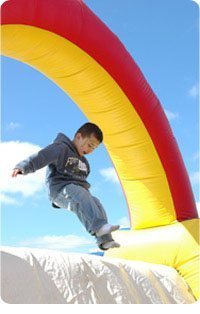
The first Healthy Kids Day
was conducted in 1992.
Local History
- In 1968 the Y moved locations to a completed facility on Edgemont Avenue (which later became Martin Luther King, Jr. Blvd) which included a men’s health club, locker rooms (for boys, men, girls, and women), three gymnasiums, indoor pool, several classrooms, club meeting rooms, youth lobby and game room, adult lobby, kitchen, fitness room (for exercise, wrestling, boxing), and a chapel.
- In 1988 the Y added a Ladies’ Health Service Center and a therapy pool to the YMCA of Bristol.
- In 1999 the Y completed renovations of the fitness room, free weight room, and nursery.
- In 1999 the Y acquired the YMCA Outdoor Center which gave the Y an outdoor sports complex for summers with swimming pools, a playground, lighted tennis court, sand volleyball courts and a basketball court.
World History
- Motivating African-American teens to academic and career success was the goal of a Black Achievers program conceived in 1967 by Quentin Mease at the South Central YMCA in Houston, Texas. In 1971 financial consultant Dr. Leo B. March at the Harlem Branch YMCA in New York initiated the Black Achievers format we know today: a volunteer adult mentoring model that helps youth to raise their academic standards and develop a positive sense of self. The program later expanded to support all teen of color.
- Many black YMCAs became meeting places and rallying points for the Civil Rights movement. In 1967 racial discrimination was banned in all YMCAs.
- The YMCA first began work on public policy issues in the later 1970s, forming the Government Relations and Public Policy Office in the nation’s capital in 1991. The office champions the YMCA mission with lawmakers and federal and state government officials. The office also works with YMCAs and state alliances to strengthen their government relations efforts, helping them advocate for the kids, families and communities they serve and deepening their influence in state capitals. Every state alliance now engages in a variety of important issues impacting YMCAs and their communities.
- In the mid-1970s the national YMCA and the NBA Players Association created the Youth Basketball Association (YBA) to organize youth into recreational sports programs that stress skills and teamwork over winning at any cost. The National YMCA Swimming and Diving Championship, originally started in 1922, became the world’s largest swimming championship with 1,500 participants.
- To encourage the healthy development of youth, YMCAs conducted the first national Healthy Kids Day in 1992, the nation’s largest health day for kids and families. Free and open to the public, it became an annual April event, designed to emphasize the importance of play in keeping kids healthy and happy and enhancing their problem-solving abilities, creativity, and motor and social skills.
- In 1994 celebrating a rich history in character development, the YMCA movement defined character as the demonstration of four core values: caring, honesty, respect, responsibility and faith. YMCA staff intentionally modeled the values with children, youth, and adult members and volunteers.
- During YMCA Service meetings help in 1996 and 1997, YMCAs voiced their desire to have the YMCA secure corporate alliances on behalf of the movement. Sponsorship allows Ys to share their mission and stories with the American public with an intensity they could not achieve on their own, increasing individual and corporate fundraising, membership and volunteer efforts.
- Although YMCAs have been engaged in the arts from their earliest days, the YMCA formally established arts and humanities as a national program in 1998, spotlighting the importance of arts to the development of a young person’s imagination, critical thinking, communication, and social skills.
- In the 1980s and 1990s baby boomers with families became more prominent as members and Ys responded by creating specific programs like family swims and family nights providing families with opportunities to play, interact, and have fun.
Founding | 1800 – 1860s | 1870 – 1890s | 1900 – 1950s | 1960 – 1990s | 2000 – present

